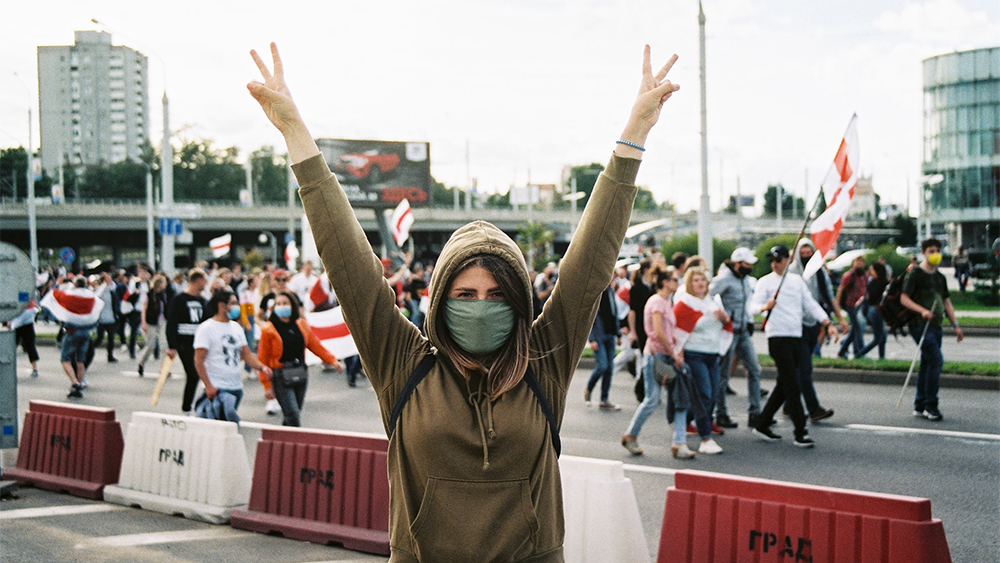Belarusian-speaking citizens face discrimination based on language on a daily basis. Some people may not get a job and are required to change the language of communication, writes the Belarusian journalist Katsiaryna Lutsevich.
Despite the fact that Russian and Belarusian languages have the same status in Belarus according to the law, the Russian language dominates the public life of the country. The use of the Belarusian language in the sphere of education, on the labor market and in state institutions is quite low, compared to Russian.
Belarusian-speaking citizens face discrimination based on language on a daily basis. Some people may not get a job and are required to change the language of communication. Parents who want to send their children to a Belarusian-language class or kindergarten are forced to send them to a Russian-language school, as they are refused for various reasons. Regarding higher education: some professors forbid students to pass the exam in Belarusian. There are cases when university management did not allow students to defend a diploma written in Belarusian and ordered them to rewrite it in Russian.
All this is only a part of the examples of language discrimination. Alina Nahornaja, a human rights activist, conducted research on the extent to which the Belarusian language is available in Belarus. The work was done on the basis of survey results, statistics and private stories. It was attended by 482 people aged 15 to 72 who use the Belarusian language.
In the opinion of Alina, the problem of discrimination against Belarusian-speaking people in Belarus is quite acute: it should be heard not only within the country. Because it’s a violation language rights – the same violation of human rights, which should not go unnoticed.
All statistical data, as well as survey results in the article, are taken from research of Alina Nahornaja ‘Accessibility and Discrimination of the Belarusian Language in Belarus. Survey Results, Statistics, Personal Stories’ (2023).
Belarusian language in education
According to Art. 82 of the Education Code, citizens of Belarus have the right to receive education in two state languages: Belarusian and Russian. This is how it is written in the Constitution: ‘The state guarantees, in accordance with the law, the freedom to choose the language of education and training’
The creation of a Belarusian-language class at school or a group in kindergarten takes place through the statements of parents. But the final decision on the opening of Belarusian-speaking groups is made by local councils. The problem is that parents’ statements do not yet guarantee that their children will be able to learn Belarusian.
The personal stories of the participants of the study demonstrate the difficulties faced by parents who want to provide their children with education in the Belarusian language.
Aliaksandra told about the case when the parents collected enough signatures, but this did not allow them to easily open a Belarusian-speaking group in the kindergarten due to the obstacles created by administration of the Pershamai district of Minsk: ‘The administration says that it is impossible to open a group. Parents did not give up; they went week after week and shook them there so that they would create that group. And nothing – they were denied everything. As a result, the parents filed a lawsuit. But the court simply did not accept their application for consideration, because, they say, there is no reason to consider it. Then the parents filed a complaint with the court for not accepting the application. And only then did the officials move. They opened that group, but in a place where everyone is uncomfortable. The Pershamai district is very large, and parents had to take their children there far away’
Valeryia shared the problems with teaching her child in a Belarusian-language kindergarten: ‘You feel language discrimination most acutely when you start raising a child. First of all, it is very expensive – books, methodical material. You can’t just go to the store and buy, for example, word cards or something like Russian-speaking mothers do. Secondly, Belarusian-speaking kindergartens are rather profanation and deception. For example, the kindergarten is positioned as Belarusian-speaking, but in fact something in Belarusian happens there only once a week’
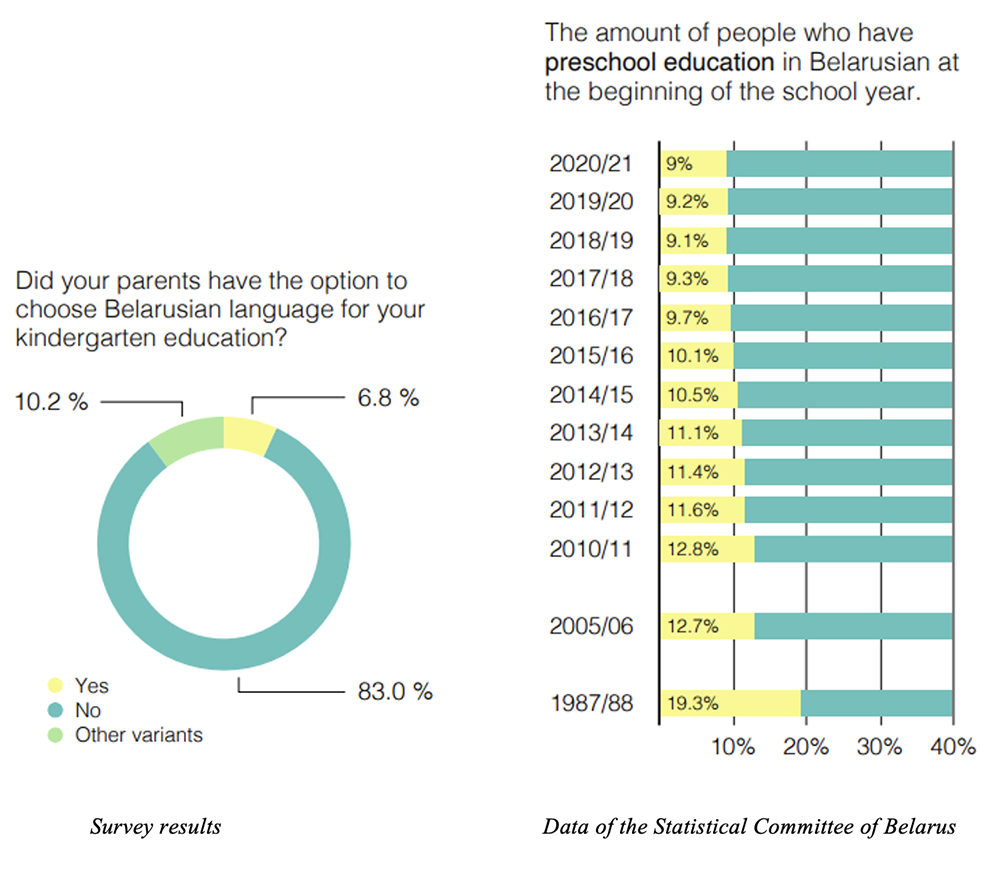
Schoolchildren, among others, face obstacles in getting an education in Belarusian. Research participant Siarzhuk talked about his experience of studying in a bilingual school: ‘At school, half of the textbooks were in Belarusian. If you read paragraph by paragraph, then when you get to the person who has a Belarusian language book, he continues to read in Belarusian. and to this almost all the teachers said: ‘Give him a Russian textbook so that everything is in Russian’. If you’re small, it doesn’t matter to you, but so I gradually forgot the Belarusian language and did not use it. Only after finishing school, I became interested in the Belarusian language again’
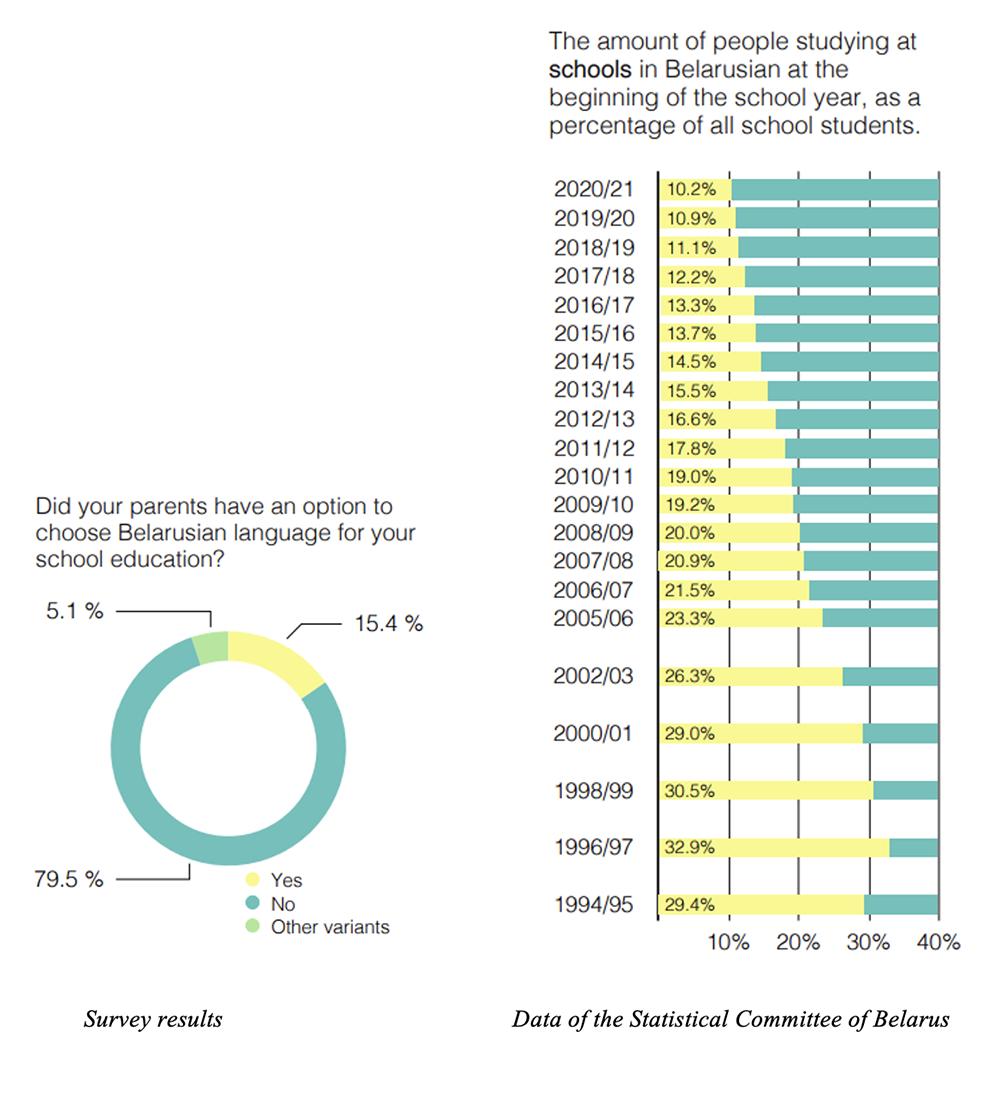
One cannot ignore the stories of university students who were not given the opportunity to learn Belarusian.
Katsiaryna: In our history faculty, all subjects that went beyond history were taught in Russian. The teachers refused to teach economics, psychology, political science, anthropology in Belarusian. Our branch was formally supposed to be Belarusian-speaking, but in fact it was not.
Tatsiana: An illustrative case happened with an acquaintance in the early 1990s. She received higher education in Vitsebsk, studying to be a biologist. She did her thesis in Belarusian. But university management did not allowed girl to defend her diploma. She defended her diploma only the following year, for which she had to translate it into Russian.
Maksim: At the exam at the university, I took the ticket, got ready, sat down and started answering in Belarusian. On the second sentence, the examiner stopped me demandingly: ‘No-no-no! You will not answer in Belarusian!’
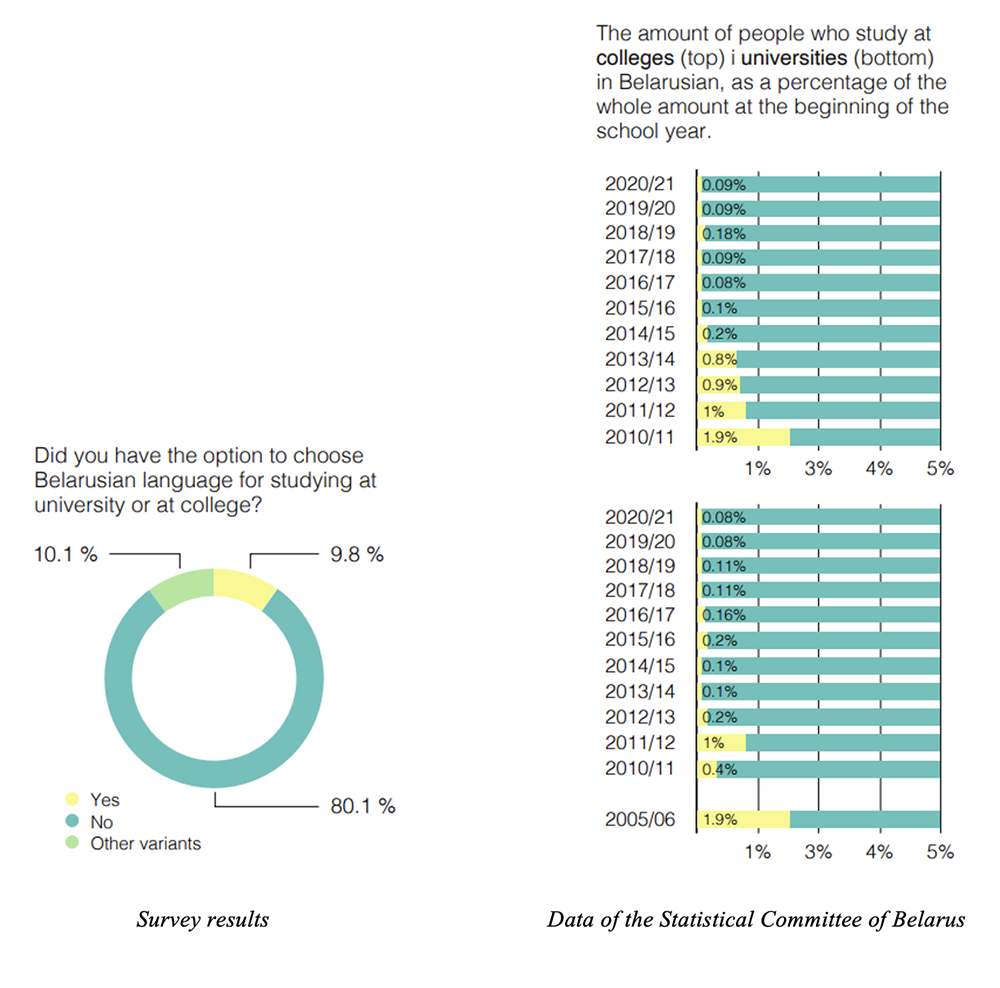
Belarusian language on the labor market
Some of the research participants faced discrimination on the basis of language when getting a job.
Hanna: My boss called me and gave me an ultimatum that I must speak Russian at work. I refused and was told there would be consequences if I didn’t comply. And in the end, they created such conditions for me that I could not work there.
Paulina: When I get a job and say in Belarusian: ‘Good afternoon, I’m interested in your vacancy’, I immediately encounter either very active aggression or passive aggression. It happens that people start making fun of me somehow.
Andrei: I worked for two years in distribution after university, and then I came to my district to get a job. I was sent to a village school. It is clear that I was speaking in Belarusian, and the school director says: ‘At least you don’t bring this abomination to us’
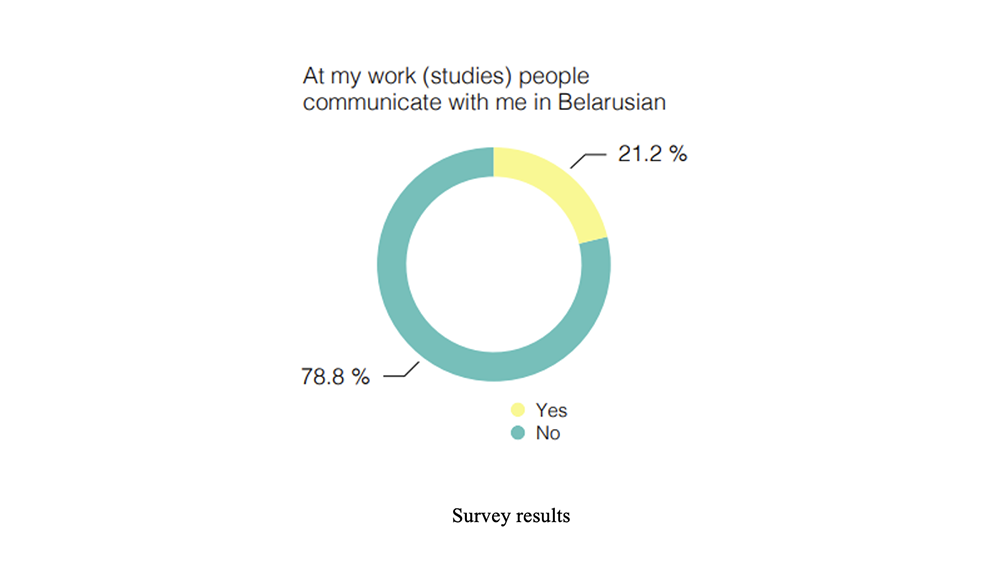
Belarusian language in state institutions
In accordance with the legislation on civil service, civil servants must be proficient in Belarusian and Russian to the extent necessary for the performance of their work duties. However, in practice, civil servants can respond in a mocking manner to those people who address them in Belarusian, and demand to speak in Russian.
Alesia: They went to the office, where the officials are sitting. And I asked them something in Belarusian, and in response I heard: ”Let’s do it in Russian, in the human language,” with such a humiliating intonation.
Dzianis: When we arranged a wedding and signed with my wife at the registry office, we previously underlined the point on the application form that we choose the ceremony in Belarusian. On the form there is such a language selection point. And here we are, so beautiful, entering the registry office, the registrar opens his mouth and conducts the entire ceremony in Russian.
Ales: The last mockery for my language was when I was detained after August of the twentieth year. I was in the 6th cell of the Zhodzina pre-trial detention center No. 8. I asked for medical help. And the ensign came and said: ‘Are you in any special account? When you learn to speak a normal language, then help will come to you’
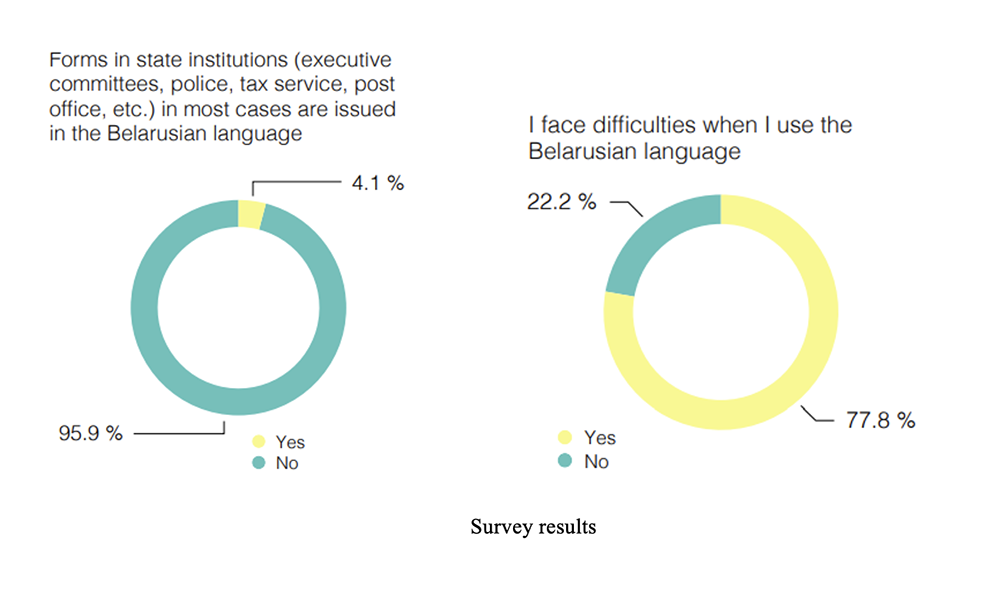
General conclusions
Discrimination on the basis of language in the sphere of education, in state institutions and on the labor is a frequent phenomenon for the majority of research participants. 77.8% of Belarusians who took part in the survey face obstacles when using the Belarusian language.
The impossibility of successfully defending oneself with legal methods in case of discrimination indicates that Belarusian-speaking people are currently a vulnerable social group. And this group needs informational support.
Katsiaryna Lutsevich
Student of Political Science in EHU, Vilnius
The research for the article is available here.
Read also:
|
Uppläsning av artikel
|

